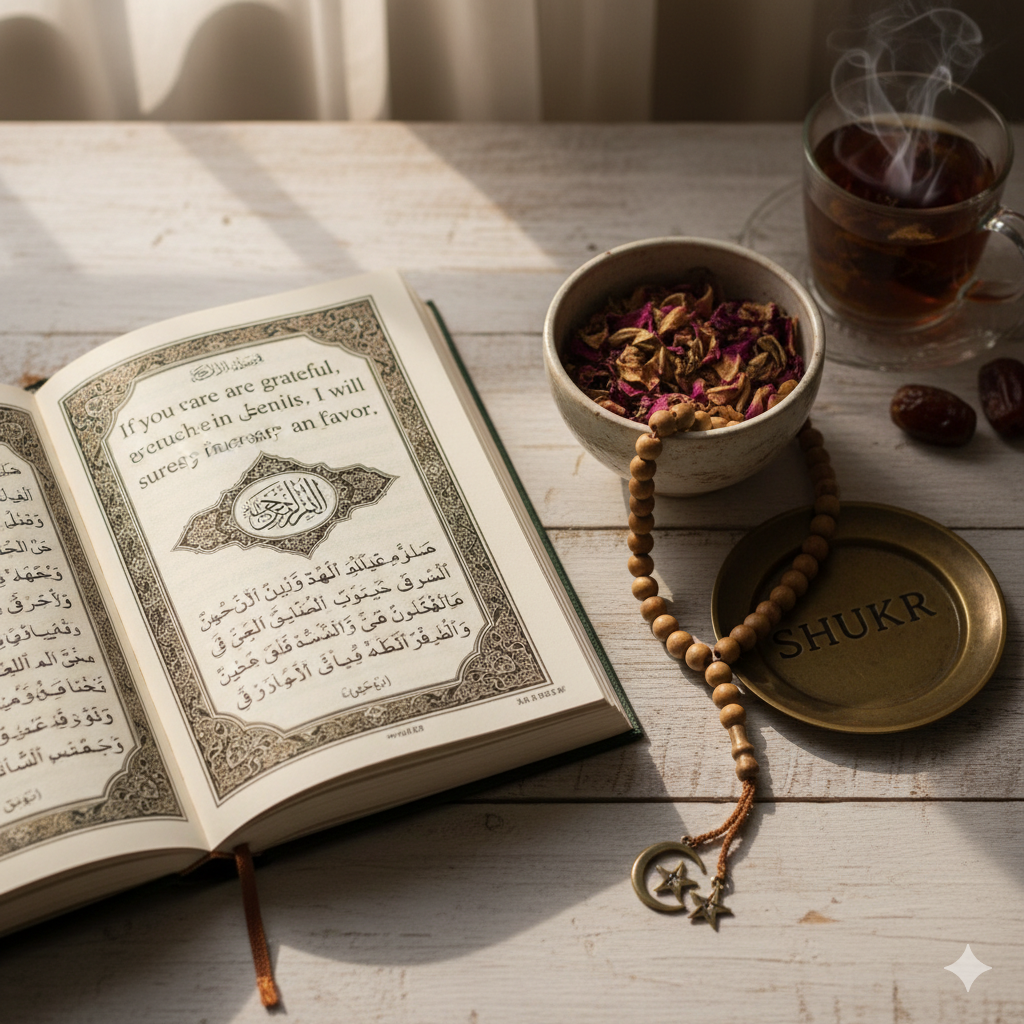In the tapestry of a Muslim’s life, two threads stand out for their strength and beauty: gratitude (shukr) and patience (sabr). These are not merely concepts but profound states of being that guide believers through life’s highs and lows, fostering a deep connection with Allah (SWT) and an unshakeable inner peace.
The Power of Shukr: Gratitude in Islam
Gratitude is more than just saying “thank you.” In Islam, shukr is an active acknowledgment of all blessings, big and small, as coming from Allah. It’s a recognition that every breath, every comfort, every moment of joy is a gift.
Key Islamic Teachings on Gratitude:
- “If you are grateful, I will surely increase you [in favor]; but if you deny, indeed, My punishment is severe.” (Quran 14:7)
- This powerful verse highlights the divine promise that gratitude brings more blessings, while ingratitude can lead to loss. It encourages a constant state of thankfulness, knowing that it unlocks further abundance.
- Prophet Muhammad (PBUH) said: “The most beloved of deeds to Allah is that you die and your tongue is moist with the remembrance of Allah.” (Tirmidhi)
- While not directly about gratitude, remembering Allah often involves acknowledging His blessings. A tongue moist with remembrance is often a tongue that expresses thanks.
- “And He gave you from all you asked of Him. And if you should count the favor of Allah, you could not enumerate them. Indeed, mankind is [generally] most unjust and ungrateful.” (Quran 14:34)
- This verse reminds us of the countless blessings bestowed upon humanity, emphasizing how impossible it is to fully count them. It’s a call to reflect on the immense generosity of our Creator.
When we practice shukr, our perspective shifts. Challenges become opportunities for growth, and everyday moments are imbued with a sense of wonder and appreciation. It transforms our hearts, filling them with contentment rather than covetousness.

The Strength of Sabr: Patience in Islam
Patience (sabr) is often misunderstood as passive waiting. In Islam, sabr is an active, enduring perseverance in the face of adversity, trials, and temptations. It’s about maintaining faith and composure, trusting in Allah’s plan, even when circumstances are difficult.
Insightful Islamic Quotes on Patience:
- “O you who have believed, seek help through patience and prayer. Indeed, Allah is with the patient.” (Quran 2:153)
- This verse provides a powerful formula for navigating life’s challenges: turn to Allah through prayer and cultivate patience. It assures believers that divine support is with those who patiently endure.
- “And be patient, [O Muhammad], for the decision of your Lord, for indeed, you are in Our eyes. And glorify the praises of your Lord when you arise.” (Quran 52:48)
- This addresses the Prophet (PBUH) directly, reminding us that even the greatest among us are called to patience. It also connects patience with remembrance and glorification of Allah.
- “Indeed, the patient will be given their reward without account.” (Quran 39:10)
- This quote reveals the immense reward awaiting those who practice sabr. It suggests that the blessings for patience are immeasurable and beyond human comprehension.
- Ali ibn Abi Talib (RA) said: “Patience is of two kinds: patience over what you dislike, and patience over what you like.”
- This profound statement expands our understanding of patience. It’s not just enduring hardship (what we dislike) but also having patience with the blessings we receive (what we like), ensuring we use them responsibly and don’t become arrogant or heedless.
Sabr equips us with resilience. It allows us to face setbacks with dignity, overcome obstacles with determination, and navigate difficult emotions with grace. It teaches us that every trial is a test, and every test, when met with patience, brings us closer to Allah.

Intertwined Virtues: Gratitude and Patience
Gratitude and patience are not isolated virtues; they are deeply interconnected. When we are grateful, we find it easier to be patient, understanding that even trials have a divine purpose and contain hidden blessings. And when we practice patience, we cultivate a deeper appreciation for the moments of ease and joy.
Consider the example of Prophet Ayyub (Job) (AS), who endured immense loss and suffering with unparalleled patience. His story teaches us that true patience is accompanied by unwavering gratitude to Allah, no matter the circumstance. His steadfastness became a testament to the power of both sabr and shukr.

Cultivating a Life of Shukr and Sabr
To integrate gratitude and patience into our daily lives, we can:
- Start and end your day with thanks: Reflect on at least three things you are grateful for each morning and evening.
- Practice mindful awareness: Pay attention to the small blessings throughout your day – a warm cup of tea, a kind word, the beauty of nature.
- Turn to prayer during hardship: When faced with a challenge, make du’a (supplication) and remind yourself of Allah’s promise to be with the patient.
- Read and reflect on the Quran: Regularly engage with the verses that speak of gratitude and patience to deepen your understanding and conviction.
- Seek good company: Surround yourself with individuals who embody these virtues, inspiring you to cultivate them within yourself.
Conclusion: The Path to Contentment
Gratitude and patience are radiant jewels in the crown of Islamic teachings. They are not merely virtues to admire but practices to live by, transforming our hearts, enriching our lives, and ultimately drawing us closer to the Divine. By embracing shukr and sabr, we unlock a profound sense of peace, contentment, and unwavering faith, navigating life’s journey with grace and hope.
